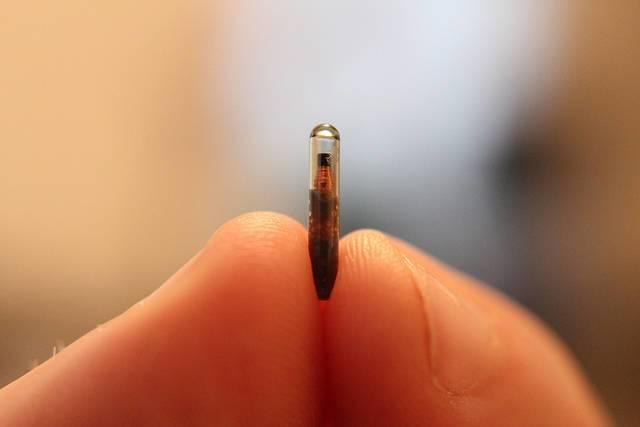
Is your Apple Pay or Android Pay still giving you fits at the checkout stand? Don't worry, you're not alone. Do you shudder at the thought of paying with your smartphone in the first place? If you are in the U.S., you are not alone on this front, either: mobile payments just have not scaled here as they have in many other countries across the world.
Well, if you're ready for the next best thing, a Midwestern vending machine operator is working on enabling its employees with a technology that reaches beyond mobile payments. This development is either brilliant and extremely convenient, or more-than-creepy, depending on your point of view.
Three Square Market, a next-gen vending machine company with 85 employees in River Falls, Wisconsin, believes microchipping humans is the future. According to several news reports, the company is partnering with BioHax International of Sweden to gauge whether radio-frequency identification (RFID) chips can have broader commercial applications beyond simply making supply chains more efficient. Three Square Market has made the implantation of these rice grain-sized chips an option for employees to test their applicability. So far the turnout has been impressive. As BBC deadpanned, "50 employees have signed up for the chance to become half-human, half-walking credit card."
Supporters of the technology tout a wide range of benefits. Forget scrounging for coins, smoothing out dollar bills or even swiping a credit card: consumers could just wave their hand to buy that soft drink or bag of Corn Nuts. The chip, which would be embedded between the thumb and forefinger, would also allow for company employees to use the photocopier, as well as enter buildings without looking like a Silicon Valley badge geek. RFID chips could also replace key fobs, so employees would have a seamless way to use that company's bike-sharing system or borrow a company car. Eventually, such technology could also become handy when buying groceries, taking public transit, or in a perfect world, function as our driver's license or passport.
Of course, opponents of such a scenario could envision all sorts of slippery slopes. Employers could monitor their workers' behavior, from spending too much time at the water cooler to sneaking out to play a little Pokémon Go. On the lighter side, if you have quite the night out and end up lost with amnesia at the local police precinct, they can figure out who you are, just like a lost dog or cat!
Companies like Three Square Market insist that this is voluntary. But as anyone knows, "voluntary" can lead to a grey area. Many workers feel obligated to play on the company's softball team, take part in an after-hours "team building activity" or donate part of their paychecks to fit in. Peer pressure, indeed, often continues after high school.
The idea of getting chipped is going to take a lot of getting used to; so are we getting ahead of ourselves in embracing this technology before we fully understand its potential?
Some politicians are already making moves to avoid what they feel is a squeamish brave new world. Nevada State Senator Becky Harris, for example, introduced a bill earlier this year that would make forcing employees to get microchipped a felony. The bill, however, did not make it out committee. In defending her bill, Harris said, "It wouldn’t prohibit the voluntary decision of a person to be microchipped," citing the example of a nightclub in Europe that offers such an option to its customers so the establishment can offer customized services.
Of course, considering the hassle of taking off those plastic bracelets the next morning after a night about town, microchipping may not be the worst option after all.
The reality is that microchipping foments a bevy of ethical issues. Who owns that information, and what happens if it that information is stolen, are only the start of questions that many employees and consumers will be asking. But supporters of the technology say that microchipping is about identification, not tracking, and in Three Square Market's case, the chips cannot be read at a distance of more than six inches.
Image credit: Dan Lane/Flickr

Leon Kaye has written for 3p since 2010 and become executive editor in 2018. His previous work includes writing for the Guardian as well as other online and print publications. In addition, he's worked in sales executive roles within technology and financial research companies, as well as for a public relations firm, for which he consulted with one of the globe’s leading sustainability initiatives. Currently living in Central California, he’s traveled to 70-plus countries and has lived and worked in South Korea, the United Arab Emirates and Uruguay.
Leon’s an alum of Fresno State, the University of Maryland, Baltimore County and the University of Southern California's Marshall Business School. He enjoys traveling abroad as well as exploring California’s Central Coast and the Sierra Nevadas.














